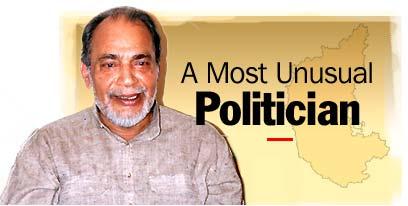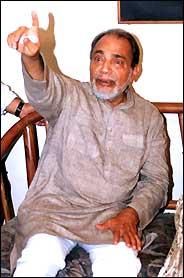
It is my day of mouna vrath, but I am breaking my vow of silence to talk just to you," said the deep, sexy voice over the telephone.
The memory of that voice, those words and the intimate silence that followed gives me a pleasant wobble in my stomach even today, more than 15 years later.
I was in my early 20s then. The man who gave me goose bumps all over was not a 20s something hunk of well toned muscle and brawn. He was a short, grey-haired grandfather whose children were far older than I was.
Shades of Joggers' Park? Not really. The man who telephoned me early one Sunday morning was then the chief minister of Karnataka. I was a young journalist starting a weekly personality column for a leading daily in Bangalore. Who better to start my column with than the colourful and intellectual chief minister of Karnataka, Ramakrishna Hegde?
That was how I came to queue up on the pavement in front of Hegde's house at dawn one winter morning, with hundreds of petitioners. Hegde's personal assistant Nagaraj had told me his boss suggested I join him for his morning constitutional. As I lived a five minute walk away from his house, which was his private home -- he had chosen not to move to the official chief minister's residence -- I simply jogged up to his gate in my blue jeans, blue silk sweater and sneakers.
I had to wait for over an hour before he emerged. Later, he told me he had a bad cold, and so, was late. Standing beside me was a small, shivering schoolgirl in a white uniform, a thin towel wrapped around her quivering shoulders. The chief minister had apparently patted her on the head and asked her name on a visit to her village in North Karnataka some weeks ago. So when the people of her village wanted to submit a petition about something to Hegde, they had chosen her to do it, and dressed her just as she had been dressed when he saw her last.
After he dealt with the numerous petitions awaiting him, we got into a car driven by the Tamilian husband of his second daughter, and drove off to the Indian Institute of Science campus, where we set off for a brisk walk. Hegde was dressed in white pants, a warm kurta and sneakers. We talked as we walked. I taped our conversation. Playing the tape back later, I found a conversation punctuated by a lot of wheezy sounding breathing: Hegde had found it rather difficult to walk briskly and talk continuously at the same time.
 That was when he told me he had really wanted to be a journalist. Instead, he became a politician. Sometimes, he said, he wished he had stuck to his original ambition. Perhaps this was why Hegde always wrote excellent pieces of analysis on a variety of subjects all through his life. He wrote booklets demystifying several of his pieces of legislation and policy, all of which he wrote entirely himself. He also composed the lectures on hard-core economic issues that he was often invited to deliver at highly academic fora.
That was when he told me he had really wanted to be a journalist. Instead, he became a politician. Sometimes, he said, he wished he had stuck to his original ambition. Perhaps this was why Hegde always wrote excellent pieces of analysis on a variety of subjects all through his life. He wrote booklets demystifying several of his pieces of legislation and policy, all of which he wrote entirely himself. He also composed the lectures on hard-core economic issues that he was often invited to deliver at highly academic fora.
It was while he was in Mangalore, exploring the possibility of being a journalist, that he met his wife Shakuntala, he told me. He stayed with her father while he was there. I had met Shakuntala at parties at my grandfather's house. She was a soft-spoken, dignified, pretty woman. The Hegdes had three children: Mamatha, Samatha and a son, Bharath.
After our walk, we went to a guesthouse in Sadashivanagar, where Hegde was having a morning briefing with the then director general of police A R Nizamuddin. "You must take a tough stance with those rowdies you have taken into custody," he told him. "I want the message going out to the underworld that we do not want them to operate in Karnataka." The outcome of that morning was the first piece of my column, which Hegde liked so much that he called me up as soon as he read it.
A couple of years later, he called me up again, to say exactly the opposite of what he had said earlier. "I am so disappointed with you," he remarked sorrowfully. "How could you write about a scandal concerning me without asking me for my side of it?" He was referring to some articles I had written on three land scandals that had dogged the end of his stormy tenure as chief minister.
How could I tell him that I was only a tool in the ongoing war he had with my then editor in the magazine I worked for? Right then, I resolved to present both sides of all such further investigative articles that I did, on whatever subject, no matter what the editorial policy of my publication was. A useful lesson I learnt in journalism, courtesy Hegde.
And then, another dozen years of all kinds of meetings, interviews, encounters, telephone conversations. Even watching a movie together in a darkened cinema hall, just the two of us. It was a rough cut of Lok Shakti, the first of two Kannada films Hegde starred in. I can never forget sitting beside him all through that film, watching him smoke cigarette after cigarette, and cough hackingly in between.
"Why do you smoke like this?" I asked him reprovingly and rather fondly. Not quite the way in which you speak to a senior national politician. But that was just how Hegde made you feel, never mind how old you were or what he was. He just smiled wryly, but went right on smoking.
In that movie, Hegde played a social worker who is killed halfway through the film. The film was a B grade thriller: ironically, Chidamber Shetty, the producer of both Hegde's films, was later the victim of what is believed to be an underworld killing.
Calling on Hegde at home to interview him was always an interesting experience. He had two living rooms, one downstairs, for the public, the other upstairs, for slightly more special visitors, which is where we would normally record our interviews, he and I. Every time, I had to submit to a thorough sniffing by his huge Alsatian, an experience that really scared me the first time. After the first few encounters, I got used to the dog, and he to me.
Hegde was not one of those politicians whose home was thrown open completely to his followers or political comrades. One got the feeling this was because Hegde was always one of your more aristocratic politicians who kept that little distance between himself and the hoi polloi.
I still remember one time when I was waiting in the sitting room upstairs when Hegde emerged in a cloud of fragrant air after a bath, clutching a wet towel. "Just give me a few moments, and I will be with you," he said, as he rushed past. He was dressed, as he often was at home, in a long black, ankle length kurta.
I would sometimes take my own photographs for my articles. I still remember getting this memorable photograph of him once, sitting in a basket chair type swing. "Don't photograph me below my waist," he said, as he sat there in his floor length kurta. "It would not look nice to have me in this long thing in a national magazine."
Interestingly, I cannot ever remember Hegde telling me anything off the record, as just about every politician I have met, including the present chief minister of Karnataka, S M Krishna, has, at some point or the other. Any question you asked Hegde, he would answer almost immediately, and with flawless logic and a ring of sincerity that simply left you convinced of the truth of what he was saying. He would never refuse to answer a question he was asked either, whatever it was.
It was only later, in the privacy of your office or computer at home, that you wondered whether every word he had spoken was really true. However, I have never found the man to contradict himself or make even a single verbal faux pas.
Another time, he asked me what I would like to drink while we talked. "Can I offer you some cold beer?" he asked. "No thanks," I stuttered. "What, you don't drink?" he asked, with a mischievous gleam in his eyes. "I never knew a journalist yet who doesn't drink!"
Yet another time, he asked me why I was single. This was before I had married the industrialist I eventually I did. "Not found a journalist to fall in love with?" he asked, with that gleam, again. "I don't think I will fall in love with another journalist," I told him then, with all the assurance of being 20 something. "I know all the single male journalists around in Bangalore, and am not attracted to any of them."
Eventually, over an acquaintance of over 15 years, I had so many hours of Hegde on tape that I erased all of them, one after the other. Not all at one time, but at various points when I needed an audiocassette urgently for an important interview. For the first few years, I had preserved every one of them. Now, I just wish I had saved at least one of them. Or that I could hear that gravelly voice with the interesting Indian accent that you could not quite pinpoint, just once more.
Photographs: Anil K Girota. Design: Lynette Menezes





 © 2025
© 2025